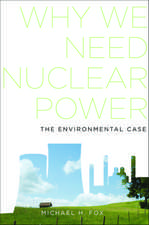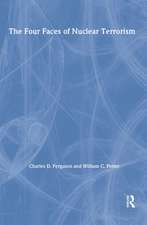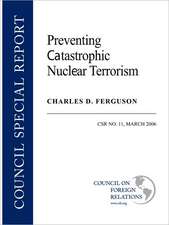Nuclear Energy: April 2007: Council Special Report, cartea 28
Autor Charles D. Fergusonen Limba Engleză Paperback – 30 apr 2007
Fears of climate change-induced catastrophe have caused many to consider nuclear energy as a viable alternative to fossil fuels. There are increasing calls for U.S. nuclear energy policy to promote a major expansion of nuclear-generated electricity in the United States and abroad. Charles D. Ferguson argues that such thinking neglects the risks and costs of massive nuclear expansion.Ferguson examines the potential contributions of expanded nuclear energy use. He balances these benefits against the risks of nuclear weapons proliferation, nuclear power plant safety and security, and disposal of radioactive waste. Ferguson recommends creating a level playing field for nuclear energy and other no- and low-greenhouse gas emission energy sources by factoring environmental, safety, and security costs into the price for each energy source. He also proposes a path for creating a less discriminatory nuclear nonproliferation system.
| Toate formatele și edițiile | Preț | Express |
|---|---|---|
| Paperback (2) | 58.75 lei 31-37 zile | |
| Oxford University Press – 11 aug 2011 | 58.75 lei 31-37 zile | |
| Council on Foreign Relations Press – 30 apr 2007 | 96.06 lei 6-8 săpt. | |
| Hardback (1) | 289.46 lei 31-37 zile | |
| Oxford University Press – 13 sep 2012 | 289.46 lei 31-37 zile |
Din seria Council Special Report
-
 Preț: 77.28 lei
Preț: 77.28 lei -
 Preț: 78.58 lei
Preț: 78.58 lei -
 Preț: 97.03 lei
Preț: 97.03 lei -
 Preț: 96.22 lei
Preț: 96.22 lei -
 Preț: 96.06 lei
Preț: 96.06 lei -
 Preț: 96.06 lei
Preț: 96.06 lei -
 Preț: 95.69 lei
Preț: 95.69 lei -
 Preț: 96.06 lei
Preț: 96.06 lei -
 Preț: 94.33 lei
Preț: 94.33 lei -
 Preț: 95.30 lei
Preț: 95.30 lei -
 Preț: 78.58 lei
Preț: 78.58 lei -
 Preț: 78.80 lei
Preț: 78.80 lei -
 Preț: 78.58 lei
Preț: 78.58 lei -
 Preț: 66.59 lei
Preț: 66.59 lei -
 Preț: 70.40 lei
Preț: 70.40 lei -
 Preț: 44.65 lei
Preț: 44.65 lei -
 Preț: 44.22 lei
Preț: 44.22 lei -
 Preț: 67.52 lei
Preț: 67.52 lei -
 Preț: 67.52 lei
Preț: 67.52 lei -
 Preț: 66.59 lei
Preț: 66.59 lei
Preț: 96.06 lei
Nou
18.38€ • 19.08$ • 15.37£
Carte tipărită la comandă
Livrare economică 15-29 martie
Specificații
ISBN-10: 0876094000
Pagini: 41
Ilustrații: 1
Dimensiuni: 205 x 273 x 4 mm
Greutate: 0.18 kg
Editura: Council on Foreign Relations Press
Seriile Council Special Reports, Council Special Report
Locul publicării:United States
Descriere
For decades, the use of nuclear energy has been extremely controversial. Worries about the dangers that nuclear plants and their radioactive waste posed to nearby communities grew over time, and plant construction in the United States virtually died after the early 1980s. The 1986 disaster at Chernobyl only reinforced nuclear power's negative image. Yet in the decade prior to the Japanese nuclear crisis of 2011, sentiment about nuclear power underwent a marked change. The alarming acceleration of global warming due to the burning of fossil fuels and concern about dependence on foreign fuel has led policymakers, climate scientists, and energy experts to look once again at nuclear power as a source of energy. In this accessible overview, Charles D. Ferguson provides an authoritative account of the key facts about nuclear energy. What is the origin of nuclear energy? What countries use commercial nuclear power, and how much electricity do they obtain from it? How can future nuclear power plants be made safer? What can countries do to protect their nuclear facilities from military attacks? How hazardous is radioactive waste? Is nuclear energy a renewable energy source? Featuring a discussion of the recent nuclear crisis in Japan and its ramifications, Ferguson addresses these questions and more in a book that is essential for anyone looking to learn more about this important issue.




